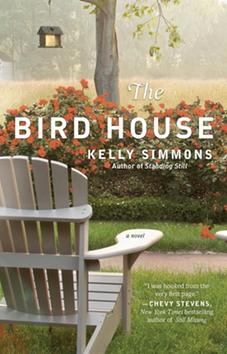The Bird House by Kelly Simmons (Washington Square Press, trade paper, $14, 9781439160930)
 Some novels are meant to be read slowly, savoring each word, while others push you to keep turning pages, teased on by the promise of secrets revealed. And then there are novels that are both, like The Bird House by Kelly Simmons. This book is so beautifully written that I felt guilty racing through it to discover what happens, and so I read it a second time, happy to spend another day under the spell of the story's brilliantly realized narrator, 73-year-old Ann Biddle Harris.
Some novels are meant to be read slowly, savoring each word, while others push you to keep turning pages, teased on by the promise of secrets revealed. And then there are novels that are both, like The Bird House by Kelly Simmons. This book is so beautifully written that I felt guilty racing through it to discover what happens, and so I read it a second time, happy to spend another day under the spell of the story's brilliantly realized narrator, 73-year-old Ann Biddle Harris.
The flap copy tells us that Ann is experiencing early signs of dementia, but I found her a generally reliable, if not always forthcoming, narrator. Though she has some minor memory problems, she is whip-smart and keenly aware of what's going on around her. Listen to Ann discussing her marriage, when she admits that her late husband might have a different view: "Theo isn't here to refute me. There's a certain glory in that, I tell you. Widowhood means I'll always have the last damn word." Or Ann reacting to her eight-year-old granddaughter's homework: "Oral history?... The things these teachers think of! Nothing an assignment, everything a project. As if children were archeologists or journalists."
But in fact, little Ellie does turn out to be an archeologist of her family, unwittingly digging up truths of the past when she recruits Ann to help with her oral history project. Over her long life, Ann has kept many secrets: about her daughter's death, her troubled marriage, and her feelings about her parents, who had disturbing secrets of their own. Yet it is the developing relationship between Ann and her granddaughter that is at the heart of The Bird House: a relationship that is always honest, often tender and sometimes very funny. Tinsley, Ann's daughter-in-law and Ellie's mother, is wary of Ann's influence on the little girl--and no wonder. Ann dares to serve the child Coke--caffeine!--and takes her out for ice cream after school. When Ellie worries that she's going to ruin her dinner, Ann calmly asks what they're having. "Spinach lasagne," Ellie says. "No great loss," Ann concludes.
Wonderful small moments like these can be found throughout the novel, but this is not a quiet book; the story is filled with mysteries, both current and more than 40 years old. I don't think it's giving away too much to point out that three of the main characters turn out to share very similar secrets. Though this could be said to stretch plausibility, it works perfectly to underscore the questions of guilt, blame and innocence at the core of the novel. One of Ann's most poignant moments is when she realizes she made a terrible mistake; she judged someone harshly because she was looking at the adult world through her "childhood eyes." To be grown up, The Bird House suggests, is to recognize that the motives--and mistakes--of other people are as complicated and difficult to understand as our own. By novel's end, we know Ann will continue to grow and change and, with Ellie, continue to celebrate all the ways life can still surprise her. --Lisa Tucker
Tucker is the author of six novels, including The Winters in Bloom, coming in September from Simon & Schuster and Brilliance Audio.

